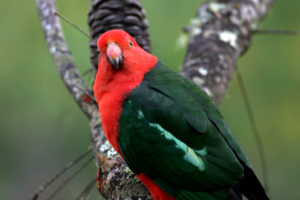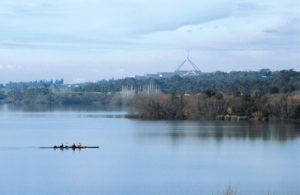Climate-ready Conservation
For decades conservationists have argued that protecting species is one of the most important approaches to achieving conservation objectives.
Climate change challenges this argument because ecosystems will change and will not provide the same requirements for species as in the past. The extent and nature of such changes in particular regions and ecosystems remain uncertain. However, effects of climate change on biodiversity and ecosystem are happening right now.
So, will a species-focussed, static approach to conservation be effective into the future? Almost certainly not! Conservation strategies based on incremental changes to current approaches are likely to be ineffective wherever climate change has major impacts on ecosystems.

Australian king parrot (Alisterus scapularis); a spectacular and much-appreciated bird found in backyards in eastern Australia. It is currently neither rare nor endangered, but how will it fare under climate change? (Photo: John Manger, CSIRO)
Instead, a dynamic, transformational approach is needed to re-frame objectives in the face of large, uncertain environmental change. We need to ask ‘conservation of what, for what and for whom?’ The world is changing and in response we are moving towards new relationships between people and nature.
So what would a dynamic, transformational, ‘climate-ready’ approach to conservation objectives look like? First, it would need to be able to accommodate large amounts of ecological change. Secondly, it would remain relevant, feasible and legitimate under a range of uncertain trajectories of ecological and social change. Finally, it would recognise the multiple dimensions of biodiversity and ecosystems as experienced and valued by society.

Early morning rowers on Lake Burley Griffin, Canberra. The lake is artificial, created by the damming of the Molonglo River, yet it has enormous cultural and amenity value for the people of Canberra (Photo: Willem van Aken, CSIRO)
A new approach to conservation requires consideration of societal values, institutional rules, and scientific and experiential knowledge. The interaction of values, rules and knowledge forms a means for a re-framed perspective, whereby conservation to maintain ecosystem processes and biodiversity provides benefits for society as it adapts to climate change.
To put a new approach to ‘conservation by people’ into practice requires engagement, learning, and co-creation. Dialogue about shared and differing aspirations and world views on conservation is an essential part of the process of change. These approaches have been put into practice in a case study in Colombia: “Future-Proofing Conservation”, involving practitioner partners
developing shared understandings of climate adaptation and its socio-political framing, being reflexive about individual and institutional frameworks that shape and create new options for change, and creating spaces where stakeholders can develop ideas, discuss social values, share information, and consider current institutional rules and future possibilities for change (van Kerkhoff et al. 2018; Munera et al., 2019).
For more information:
Munera C, Roux D., Colloff MJ, van Kerkhoff, L. (2020) Beyond calendars and maps: rethinking time and space for effective management and knowledge governance in protected areas. Land 9(9), article no. 293. https://doi.org/10.3390/land9090293
Munera, C. and van Kerkhoff, L. (2019) Diversifying knowledge governance for climate adaptation in protected areas in Colombia. Environmental Science and Policy 94, 39–48. https://doi.org/10.1016/j.envsci.2019.01.004
van Kerkhoff, L., Munera, C., Dudley, N., Guevara, O., Wyborn, C., Figueroa, C., Dunlop, M., Abud Hoyos, M., Castiblanco, J. and Becerra, L. (2018) Towards future-oriented conservation: managing protected areas in an era of climate change. Ambio 48, 699–713. https://doi.org/10.1007/s13280-018-1121-0
Colloff, M.J., Lavorel, S., van Kerkhoff, L.E., Wyborn, C.A., Fazey, I., Gorddard, R., Mace, G.M., Foden, W.B., Dunlop, M., Prentice, C., Crowley, J., Leadley, P. and Degeorges, P. (2017) Transforming conservation science and practice for a post-normal world. Conservation Biology 31, 1008-1017. http://dx.doi.org/10.1111/cobi.12912
Wyborn, C.A., Dunlop, M., Dudley, N., van Kerkhoff, L. and Guevara, O. (2016) Future Oriented Conservation: knowledge governance, uncertainty and learning. Biodiversity and Conservation 25, 1401-1408. http://dx.doi.org.10.1007/s10531-016-1130-x
Dunlop, M., Parris, H., Ryan, P. and Kroon, F. (2013) Climate-ready Conservation Objectives: A Scoping Study. National Climate Change Adaptation Research Facility, Southport, Qld. https://www.nccarf.edu.au/publications/climate-ready-conservation-objectives-scoping-study
